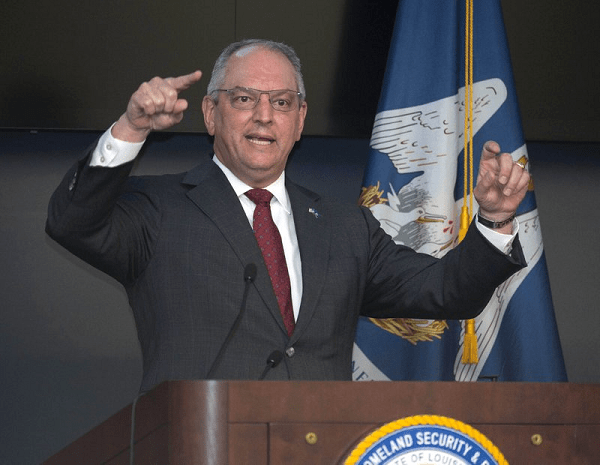
10.27.20 – AP
Gov. John Bel Edwards on Tuesday vetoed the centerpiece bill of Louisiana’s just-ended special session, a measure seeking to give lawmakers more authority in a governor’s emergency decisions, including the ability to jettison individual coronavirus restrictions.
The Democratic governor’s decision was expected. But Edwards’ official announcement that he had rejected the bill was confirmation that lawmakers had held a nearly four-week special session — costing taxpayers an estimated $1 million — with little to show for one of their main agenda items.
“This bill allows for legislators to cast votes on life or death decisions from their homes via text message,” the governor wrote in his veto letter. “This bill simply does not represent a serious approach to responding to a public health emergency.”
The Republican-passed bill sponsored by Covington Rep. Mark Wright would have given lawmakers the ability to nullify individual pieces of a governor’s emergency order by a majority vote through a ballot for any emergency declaration extended beyond 30 days.
GOP lawmakers said it’s inappropriate for Edwards to continue making all the decisions related to the pandemic seven months after the virus outbreak began in Louisiana.
Edwards has loosened his restrictions several times, but the governor said Wright’s legislation “would put at risk all of the gains the state of Louisiana has made” in combating the virus outbreak.
Edwards also rejected a separate measure sponsored by House GOP leader Blake Miguez to prohibit the use of private grant dollars for election-related expenses. Lawmakers passed the measure on a largely party-line vote after Republican Attorney General Jeff Landry sought to block millions of dollars in grants offered to Louisiana’s local elections officials through a nonprofit backed by Facebook founder Mark Zuckerberg.
Lawmakers could seek to hold a veto session to try to override the governor’s action, but Republicans don’t have enough votes in the House to reach the two-thirds threshold to overturn a gubernatorial veto.
With the emergency powers legislation scrapped, lawmakers are awaiting a court’s decision on House Republicans’ effort to rescind all of Edwards’ coronavirus restrictions through a never-before-used state law. The statute allows a majority of legislators in either the House or Senate to sign a petition to revoke a governor’s emergency declaration — and all the restrictions and rules tied to it.ADVERTISEMENT
Republican lawmakers convened the session themselves, with many GOP lawmakers in the House pushing to curb the governor’s COVID-19 mask mandate and restrictions on businesses, high school sports and other activities.
Republican Senate President Page Cortez, however, suggested lawmakers faced constitutional limits of what they could do to revoke Edwards’ emergency rules. All House Republican efforts to immediately end the governor’s coronavirus restrictions — or suspend his administration’s enforcement ability of them — stalled in the Senate.
Republicans in the House and Senate spent weeks haggling over just how much they would try to rein in the governor’s powers. And the deal they finally struck couldn’t survive Edwards’ veto pen.
With the veto announced, attention moves squarely to the petition delivered to Edwards on Friday.
Sixty-five Republican lawmakers in the 105-member House signed the petition, scrapping the governor’s emergency declaration and prohibiting him from enacting another coronavirus emergency proclamation for seven days.
Edwards said he doesn’t believe the law allowing legislators in only one chamber to overturn a governor’s emergency declaration is constitutional. He’s asserted his restrictions remain in place, and his administration continues to enforce them. And the governor filed a lawsuit challenging the petition’s legality.
A judge has yet to rule on the challenge.
___
The bills are filed as House Bills 4 and 51.
___
Follow Melinda Deslatte on Twitter at http://twitter.com/melindadeslatte
